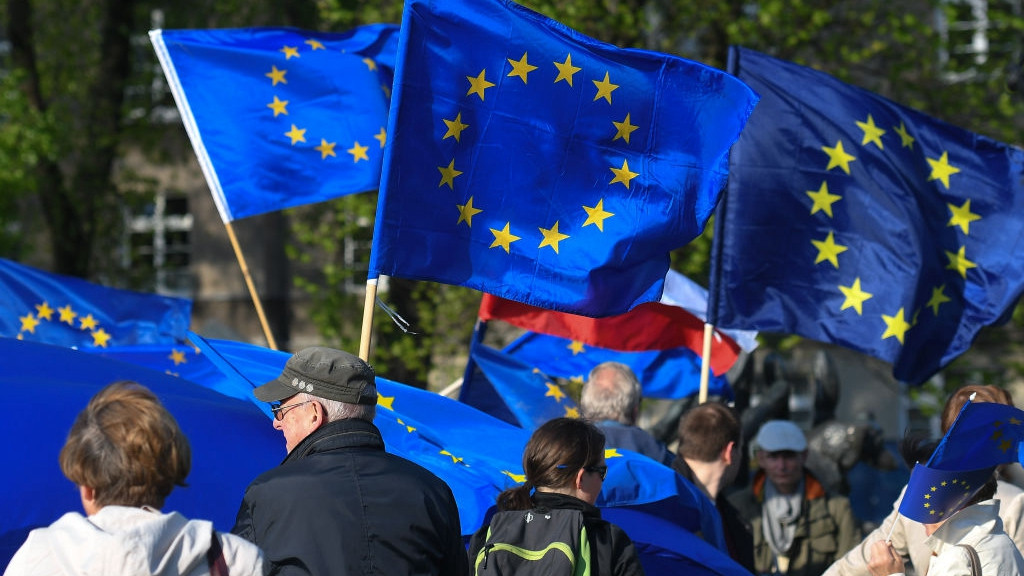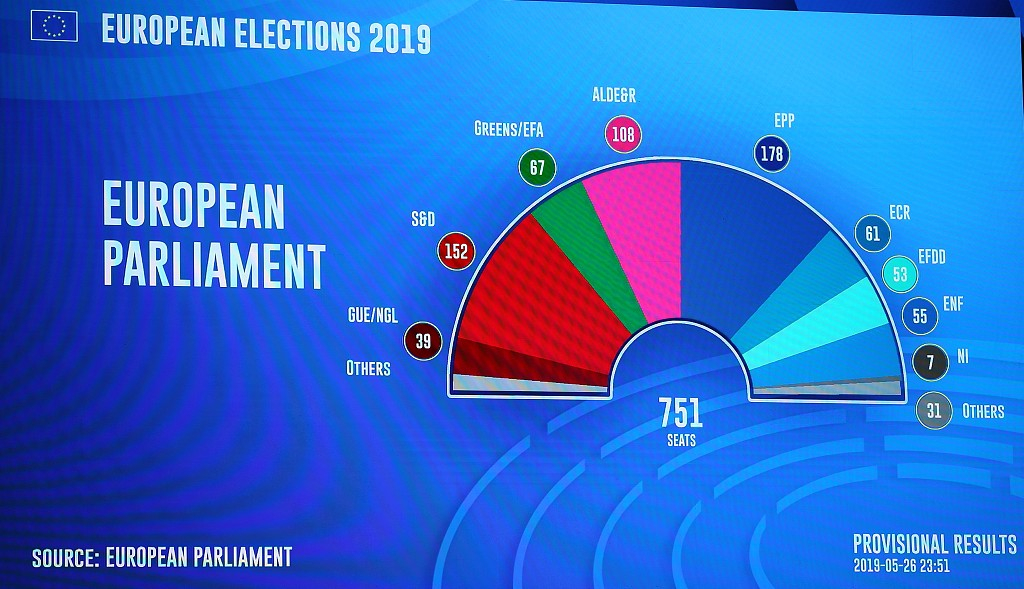
Opinion
11:11, 27-May-2019
Britain's EU election results reveal a divided nation
Tom Fowdy

Editor's note: Tom Fowdy is a British political and international relations analyst and a graduate of Durham and Oxford universities. He writes on topics pertaining to China, the DPRK, Britain and the U.S. The article reflects the author's opinion, and not necessarily the views of CGTN.
Britain's European Parliamentary Election results on Sunday night saw voters desert the country's two major parties and flock to outsiders, with Nigel Farage's Brexit Party, the Liberal Democrats and the Greens being the largest benefactors. The Conservative Party, now commencing with a new leadership contest, finished in 5th place with just nine percent of the vote, experiencing its worst national election finish since the year 1842. The Labour Party had little more to cheer about, attaining 14 percent which will also go down as a record low for a party in opposition in EU elections.
The results reflect a nation strongly divided on the matter of Brexit. In the aftermath of the results, both sides of the debate have moved to declare victory for their own cause, leavers pointing towards Nigel Farage's sweeping lead in most regions of the country, while remain supporters arguing that the majority of the public voted on aggregate for parties supporting membership of the European Union. With both sides viewing the outcome in this way, the result is that the election has not been decisive enough to influence the broader narrative pertaining to Brexit. It changes little. The divide and the debate will continue, fiercely.

A board shows the first early election results of European Parliament (EP) elections at EP General Assembly Hall in Brussels, Belgium, May 26, 2019. /VCG Photo
A board shows the first early election results of European Parliament (EP) elections at EP General Assembly Hall in Brussels, Belgium, May 26, 2019. /VCG Photo
Brexit is serving to completely reshape electoral politics in Britain, redrawing the country's divides, not in terms of traditional partisan labels, but along the lines of "leave" and "remain."
The issue has proved to be of such a magnitude that voters have been willing to step outside of their traditional voting habits and consider new alternatives. Whilst, of course, European Elections have long been subject to protest voting habits and paved way for unconventional choices, nevertheless, the traditional British dynamic of choosing either the "government or the opposition" has always remained significant; hence whilst UKIP came first in 2014, the Labour party nevertheless trailed closely.
But now things are completely different. While this election might be conceived in terms of a protest, it was unique for the fact the electorate completely deserted both major parties and outsiders soared. The overall winner was a party formed little over six months ago, defined only by its name than a serious set of policies. The runner up was a party that has never breached third place in a general election. In every sense, the two parties political order was completely thrown out of the window and the new focus was not on party lines, but where each respective contender stood in relationship to Brexit. The Conservative party was punished for Theresa May's inability to deliver Brexit, while Labour was bruised for either being too anti-Brexit (in leave constituencies) or not being anti-Brexit enough (in remain constituencies) and as a whole indecisive on the issue.

Soldiers of a Eurocorps detachment raise the European Union flag during the open day at the European Parliament in Strasbourg, eastern France, May 19, 2019. /VCG Photo
Soldiers of a Eurocorps detachment raise the European Union flag during the open day at the European Parliament in Strasbourg, eastern France, May 19, 2019. /VCG Photo
Given this, both tribes of the Brexit divide moved to declare victory for their cause, yet neither was quite able to dismiss the argument of the others. With Nigel Farage's Brexit party finishing first and gaining 28 seats, the newly formed group become the largest delegation in the entire EU parliament, leavers claim it is solid proof Britain still wants Brexit. On the other hand, remain supporters argue that the aggregate total of votes for pro-remain parties, including the Liberal Democrats, Greens, SNP, Plaid Cymru, and Change UK, added up to more than those advocating Brexit, thus the public has "changed in its mind" and wants to remain.
With the narrative being firmly split down both sides, the result is a mixed message which changes nothing. Both remained and leavers are taking what they want to see from the elections and thus no "grand narrative" has been set which is able to change the parameters of the issue as a whole or shift the momentum in either direction. What does this mean? It means in effect the European parliament results change very little and only serve to intensify and entrench the positions of both sides against each other. This means neither will give in and Britain's Brexit debate will continue in an extremely divisive and unsettled manner.
The major parties are likely in turn to respond by following these lines. The Conservatives will see the loss of leave supporters and Nigel Farage as their biggest threat. They will see opportunity in taking a harder Brexit position to steal these voters back and also steal leave voters in traditional Labour areas in the North of England. On the other hand, the Labour party cannot deny the damage caused by the huge leakage of remain supporters to the Liberal Democrats and Greens. It may be tempted to harden its stance against Brexit to win these people back at the expense of their smaller leave constituency in the North.
Thus, the European election reveals a divided nation. It has not been decisive enough to sway the debate either way and will, in turn, harden and consolidate the newly formed divides than offer any kind of solution.
(If you want to contribute and have specific expertise, please contact us at opinions@cgtn.com.)

SITEMAP
Copyright © 2018 CGTN. Beijing ICP prepared NO.16065310-3
Copyright © 2018 CGTN. Beijing ICP prepared NO.16065310-3